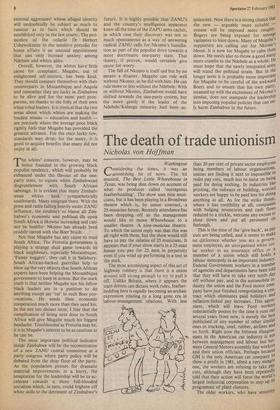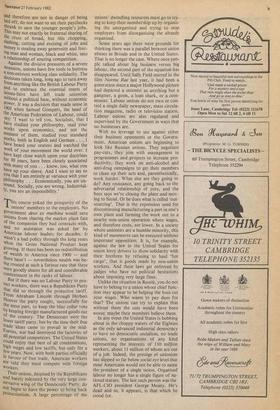The death of trade unionism
Nicholas von Hoffman
Washington ConsiConsidering the times, it was an dering bit of news. The hit musical, The Best Little Whorehouse in Texas, was being shut down on account of what its producer called 'outrageous featherbedding'. The show uses nine musi- cians, but it has been playing in a Broadway theatre which is, by union contract, a 25-musician house. Recently attendance has been dropping off so the management would like to move Whorehouse to a smaller theatre. A nine-musician theatre. To which the union reply was that this was all right with them, but the show would still have to pay the salaries of 25 musicians. It appears that if your show starts in a 25-man house you pay for 25 men in perpetuity even if you wind up performing in a tent in the park.
The most astonishing aspect of this act of highway robbery is that there is a union around still strong enough to try to pull it off. Unlike Britain, where it appears the train drivers can dictate work rules, feather- bedding here is rapidly becoming an archaic expression relating to a long gone era in labour-management relations. With less
than 20 per cent of private sector employees being members of labour organisations, unions are finding it next to impossible to resist pay cuts, much less to insist on being paid for doing nothing. In industries like printing, the railways or building, worried workers are happy to be paid less for doing anything at all. As for the strike threat, where it has credibility at all, companies with bulging inventories and cash flows reduced to a trickle, welcome any excuse to close down and put all personnel on furlough. This is the time of the `give-back', as PO cuts are being called, and it seems to make no difference whether you are a govern- ment employee, an unorganised white col- lar worker in an insurance office or a member of a union which still holds a labour monopoly in an important industrY. Federal Government workers in a number of agencies and departments have been told that they will have to take very tenth day off without pay, and in the automobile in- dustry the union and the Ford motor com- pany have just finished renegotiating a con- tract which eliminates paid holidays and inflation-linked pay increases. This agree- ment, which will leave Ford workers substantially poorer by the time it runs our several years from now, is merely the best publicised of any number of other similar ones in trucking, steel, rubber, airlines and so forth. Right now the bitterest disagree- ment in the American car industry is not between management and labour but bet- ween General Motors assembly line workers and their union officials. Perhaps because GM is the only American car company to show a profit in 1981, albeit a very meagre one, the workers are refusing to take PO cuts, although they have been repeatedly told that their action will force the world s largest industrial corporation to step up its programme of plant. closures.
The older workers, who have seniority and therefore are not in danger of being laid off, do not want to see their paychecks shrunk to save the younger people's jobs. This may not exactly be fraternal sharing of the crust of bread, but this chopping, slashing, cutting and excising of jobs and money Orley is stealing away generosity and forc- ing man and woman, black and white, into a relationship of souring competition.
Against the divisive pressures of a severe recession, unions have few tools to buttress a non-existent working class solidarity. The decisions taken long, long ago to turn away from anything like the British Labour Party and to embrace the essential tenets of laissez-faire have left trade unionism Without a political base, without economic Power. It was a decision that made sense in 1903 when Samuel Gompers, the head of the American Federation of Labour, could say: 'I want to tell you, Socialists, that I have studied your philosophy, read your Works upon economics, and not the Meanest of them, studied your standard works, both in English and German . . I have heard your orators and watched the work of your movement the world over. I have kept close watch upon your doctrines for 30 years, have been closely associated With many of you . . . know, too, what you have up your sleeve. And I want to say to You that I am entirely at variance with your Philosophy . . . Economically, you are un- sound. Socially, you are wrong. Industrial- ly, You are an impossibility.'
This course yoked the prosperity of the unions' members to the employers. No government deus ex machina would save unions from sharing the market place fate of the companies they had contracts with, and no assistance was asked for by American labour leaders for decades. It wasn't a bad policy through the long years when the Gross National Product kept growing. If there has been no redistribution of wealth in America since 1900 — and there hasn't — nevertheless wealth was be- ing created at such a furious rate that there Were goodly shares for all and considerable contentment in the ranks of labour.
But if there was no Labour Party to pro- tect workers, there was a Republican Party that did so through the protective tariff. From Abraham Lincoln through Herbert Hoover the party sought, successfully for the most part, to keep the blue collar vote by keeping foreign manufactured goods out of the country. The Democrats were the lower tariff party, but by the time their free trade ideas came to prevail in the mid- Forties, war had destroyed the factories of all Potential competitors. The United States Could enjoy that best of all combinations, high wages and low tariffs, but only for a few years. Now, with both parties officially in favour of free trade, American workers are told they must compete with foreign workers.
Their unions, despised by the Republicans and barely tolerated by the very large con- servative wing of the Democratic Party, do not begin to have the power to bring back protectionism. A large percentage of the unions' dwindling resources must go to try- ing to keep their membership up by organis- ing the unorganised and trying to stop employers from disorganising the already organised.
Some years ago there were grounds for thinking there was a parallel between union abuses in Britain and in the United States. That is no longer the case. Where once peo- ple talked about big business versus big labour, the second part of the equation has disappeared. Until Sally Field starred in the film Norma Rae last year, it had been a generation since a major Hollywood picture had depicted a unionist as anything but a gangster, a goon, a loan shark, or a com- munist. Labour unions do not own or con- trol a single daily newspaper, mass circula- tion magazine, radio or television station. Labour unions are also regulated and supervised by the Government in ways that no businesses are.
With no leverage to use against either their business opponents or the Govern- ment, American unions are beginning to look like Russian unions. They negotiate pay-cuts, they join with management in programmes and projects to increase pro- ductivity, they work on anti-alcohol and anti-drug campaigns to get their members to clean up their acts and, parenthetically, work harder. What else are they going to do? Any resistance, any going back to the adversarial relationship of yore, and the boss says we're closing the plant and mov- ing to Seoul. Or he does what is called 'out- sourcing'. That is the expression used for discontinuing manufacturing a part in one's own plant and farming the work out to a nearby non-union operation where wages, and therefore costs, are lower. In a society where unionists are a humble minority, this kind of manoeuvre can be executed without important opposition. It is, for example, against the law in the United States for union lorry drivers to show solidarity with their brethren by refusing to haul 'hot cargo', that is goods made by non-union workers. And these laws get enforced by judges who have no political hesitations about imposing very large fines.
Unlike the situation in Russia, you do not have to belong to a union whose chief func- tion may appear to be helping the boss cut your wages. Who wants to pay dues for that? The unions can try to explain that without them the cuts would have been worse; maybe their members believe them.
In any event the United States is bobbing about in the choppy waters of the Eighties as the only advanced industrial democracy to have no democratic socialism, no trade unions, no organisations of any kind representing the interests of 110 million workers, about 11 million of whom are out of a job. Indeed, the prestige of unionism has slipped so far below social eye level that most Americans would not be able to name the president of a single union. Organised labour no longer has a single figure of na- tional stature. The last such person was the AFL-CIO president George Meany. He's dead and so, it appears, is that which he stood for.





































 Previous page
Previous page